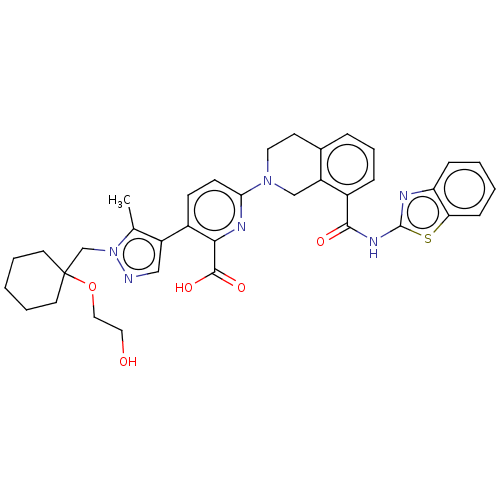

 Search and Browse
Search and Browse
 Download
Download
 Enter Data
Enter Data
| Target/Host (Institution) | Ligand | Target/Host Links | Ligand Links | Trg + Lig Links | Ki nM | ΔG° kJ/mole | IC50 nM | Kd nM | EC50/IC50 nM | koff s-1 | kon M-1s-1 | pH | Temp °C |
|---|---|---|---|---|---|---|---|---|---|---|---|---|---|
| Bcl-2-like protein 1 (Homo sapiens (Human)) | BDBM209223 (US9266877, 169) | PDB MMDB NCI pathway Reactome pathway KEGG UniProtKB/SwissProt B.MOAD DrugBank antibodypedia GoogleScholar AffyNet | PC cid PC sid UniChem | US Patent | <0.100 | <-57.1 | n/a | n/a | n/a | n/a | n/a | n/a | 25 |
ABBVIE INC. US Patent | Assay Description The measurement of competition of compounds of Formula (I) with F-Bak for a Bcl-2 family protein (Bcl-xL) binding site using a Time Resolved Fluoresc... | US Patent US9266877 (2016) BindingDB Entry DOI: 10.7270/Q2H41Q7V | |||||||||||
| More data for this Ligand-Target Pair | |||||||||||||
| Bcl-2-like protein 1 (Mus musculus (Mouse)) | BDBM209223 (US9266877, 169) | PDB UniProtKB/SwissProt B.MOAD GoogleScholar AffyNet | PC cid PC sid UniChem | US Patent | n/a | n/a | n/a | n/a | 10 | n/a | n/a | n/a | n/a |
ABBVIE INC. US Patent | Assay Description The efficacy of the compounds of Formula (I) can also be determined in cell-based killing assays using a variety of cell lines and mouse tumor models... | US Patent US9266877 (2016) BindingDB Entry DOI: 10.7270/Q2H41Q7V | |||||||||||
| More data for this Ligand-Target Pair | |||||||||||||